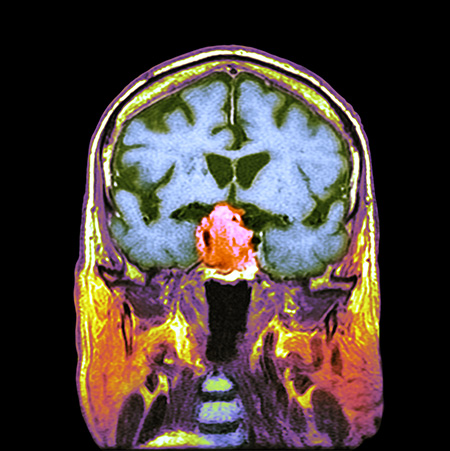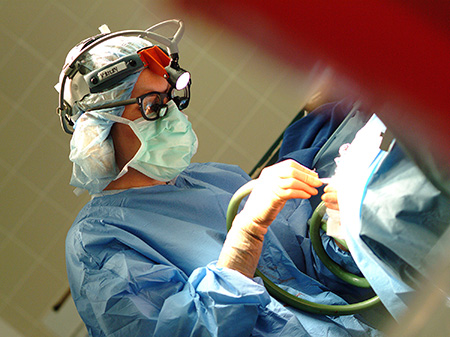 UAB surgeons removed a rare pituitary gland tumor from a Cullman woman that had defied diagnosis for years.It took four months of detective work, but physicians at the University of Alabama at Birmingham found the rare cause of a woman’s medical issues. UAB’s joint pituitary disorders clinic, featuring the unusual combination of endocrinology and neurosurgery, identified and removed a pituitary tumor from Debra Nelson that had gone undiagnosed for more than six years.
UAB surgeons removed a rare pituitary gland tumor from a Cullman woman that had defied diagnosis for years.It took four months of detective work, but physicians at the University of Alabama at Birmingham found the rare cause of a woman’s medical issues. UAB’s joint pituitary disorders clinic, featuring the unusual combination of endocrinology and neurosurgery, identified and removed a pituitary tumor from Debra Nelson that had gone undiagnosed for more than six years.
“While pituitary tumors are fairly common, the kind Debra had is the exception, accounting for only about 1 percent of all pituitary tumors,” said Kristen Riley, M.D., a neurosurgeon in the UAB Department of Neurosurgery in the School of Medicine. “She had a TSH secreting tumor, or thyroid stimulating hormone secreting tumor.”
The pituitary gland is about the size of a black-eyed pea with a stem, Riley says. It is located at the base of the brain, behind the bridge of the nose. It produces hormones that affect other glands or organs in the body, and it helps manage and control hormone production in those glands.
In Nelson’s case, the TSH secreting tumor on her pituitary gland sent signals to her thyroid to over-produce its two hormones, triiodothyronine and thyroxine. These two hormones control the body’s metabolism and help regulate how every cell in the body uses energy. An overactive thyroid can lead to heart problems, increased appetite and metabolic issues. Nelson spent more than six years looking for answers, all the while at risk for a thyroid crisis, sometimes called a thyroid storm, which can potentially be fatal.
“This is a difficult condition to diagnose,” Riley said. “It takes a multidisciplinary effort, with expertise from endocrinology as well as neurosurgery, which is why UAB is one of the few medical centers able to offer this type of clinic.”
“Nelson presented with a variety of potential rare conditions based on some exotic laboratory results,” said Brooks Vaughan III, M.D., an associate professor in the Division of Endocrinology, Diabetes and Metabolism, Department of Medicine, and medical director of the Neurosurgical Pituitary Disorder Clinic.
Vaughan says Nelson’s local physician had appropriately ordered a number of tests, but the results that came back were confusing. For example, tests showed the level of one particular hormone to be elevated. Usually in that situation, a second hormone should test low. But in Nelson’s case, test results indicated elevated levels of both hormones.
“Her test results were very unusual, so we began the process of whittling down those potential causes,” Vaughan said. “It took about four months of medical detective work — conducting tests and trying different medications — until we were confident that the issue was a TSH secreting tumor on the pituitary gland.”
The tumor turned out to be wrapped around the carotid artery, which supplies blood to the brain as it passes by the pituitary gland. That is a delicate surgery.
“Pituitary tumors often push against the optic nerve, leading to vision issues,” Riley said. “We were able to remove about 90 percent of the tumor without causing damage to either the carotid artery or the optic nerve. The reduction in TSH allowed her thyroid to return to normal hormone production.”
 Neurosurgeon Kristen Riley was able to remove 90 percent of the tumor as it wrapped around the carotid artery.“It was the best outcome that we and Debra could have hoped for,” Vaughan said. “There are only about five to 10 places in the entire country where patients can see a neurosurgeon and endocrinologist on the same day, at the same time and in the same room. Working independently, this would have been very difficult to diagnose.”
Neurosurgeon Kristen Riley was able to remove 90 percent of the tumor as it wrapped around the carotid artery.“It was the best outcome that we and Debra could have hoped for,” Vaughan said. “There are only about five to 10 places in the entire country where patients can see a neurosurgeon and endocrinologist on the same day, at the same time and in the same room. Working independently, this would have been very difficult to diagnose.”
“This was a complex case even for an institution as advanced as UAB,” Riley said. “This really highlights the kind of patient who needs to be seen at a pituitary clinic with multiple disciplines available.”
Riley says they will use sophisticated imaging to keep an eye on Nelson’s tumor to be sure it does not begin to grow again.
Nelson, who is a health care professional herself, is ecstatic.
“I was floored by the kindness I experienced at UAB,” she said. “The neuro-intensive care unit had the best nurses I’ve ever had. Dr. Vaughan’s nurse, Tracy Rouse, was outstanding. Drs. Riley and Vaughn were so diligent in working to find out what my issues were and figuring out a way to treat them.”
“Complex cases such as this are why it is challenging yet so rewarding to be a doctor,” Vaughan said.